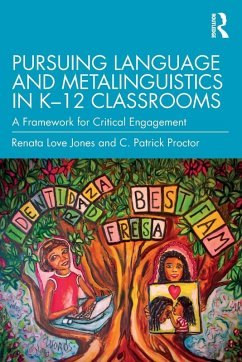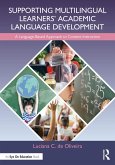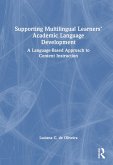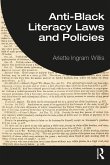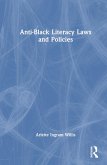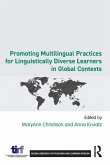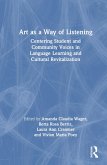Renata Love Jones, C. Patrick Proctor
Pursuing Language and Metalinguistics in K-12 Classrooms
A Framework for Critical Engagement
Renata Love Jones, C. Patrick Proctor
Pursuing Language and Metalinguistics in K-12 Classrooms
A Framework for Critical Engagement
- Broschiertes Buch
- Merkliste
- Auf die Merkliste
- Bewerten Bewerten
- Teilen
- Produkt teilen
- Produkterinnerung
- Produkterinnerung
This conceptually expansive volume provides a theoretical framework and practical guide for designing and implementing literacy instruction that promotes studentsâ critical metalinguistic awareness in K-12 classroom contexts.
Andere Kunden interessierten sich auch für
![Supporting Multilingual Learners' Academic Language Development Supporting Multilingual Learners' Academic Language Development]() Luciana C. de Oliveira (US Virginia Commonwealth University)Supporting Multilingual Learners' Academic Language Development37,99 €
Luciana C. de Oliveira (US Virginia Commonwealth University)Supporting Multilingual Learners' Academic Language Development37,99 €![Supporting Multilingual Learners' Academic Language Development Supporting Multilingual Learners' Academic Language Development]() Luciana C. de Oliveira (US Virginia Commonwealth University)Supporting Multilingual Learners' Academic Language Development172,99 €
Luciana C. de Oliveira (US Virginia Commonwealth University)Supporting Multilingual Learners' Academic Language Development172,99 €![Building Literacy Through Pop Culture in the ELA Classroom Building Literacy Through Pop Culture in the ELA Classroom]() Jen McConnelBuilding Literacy Through Pop Culture in the ELA Classroom57,99 €
Jen McConnelBuilding Literacy Through Pop Culture in the ELA Classroom57,99 €![Anti-Black Literacy Laws and Policies Anti-Black Literacy Laws and Policies]() Arlette Ingram Willis (University of Illinois at Urbana-Champaign)Anti-Black Literacy Laws and Policies39,99 €
Arlette Ingram Willis (University of Illinois at Urbana-Champaign)Anti-Black Literacy Laws and Policies39,99 €![Anti-Black Literacy Laws and Policies Anti-Black Literacy Laws and Policies]() Arlette Ingram Willis (University of Illinois at Urbana-Champaign)Anti-Black Literacy Laws and Policies154,99 €
Arlette Ingram Willis (University of Illinois at Urbana-Champaign)Anti-Black Literacy Laws and Policies154,99 €![Promoting Multilingual Practices for Linguistically Diverse Learners in Global Contexts Promoting Multilingual Practices for Linguistically Diverse Learners in Global Contexts]() Promoting Multilingual Practices for Linguistically Diverse Learners in Global Contexts62,99 €
Promoting Multilingual Practices for Linguistically Diverse Learners in Global Contexts62,99 €![Art as a Way of Listening Art as a Way of Listening]() Art as a Way of Listening164,99 €
Art as a Way of Listening164,99 €-
-
-
This conceptually expansive volume provides a theoretical framework and practical guide for designing and implementing literacy instruction that promotes studentsâ critical metalinguistic awareness in K-12 classroom contexts.
Produktdetails
- Produktdetails
- Verlag: Taylor & Francis Ltd
- Seitenzahl: 298
- Erscheinungstermin: 27. Dezember 2024
- Englisch
- Abmessung: 228mm x 150mm x 18mm
- Gewicht: 458g
- ISBN-13: 9781032360751
- ISBN-10: 1032360755
- Artikelnr.: 71237428
- Herstellerkennzeichnung
- Libri GmbH
- Europaallee 1
- 36244 Bad Hersfeld
- gpsr@libri.de
- Verlag: Taylor & Francis Ltd
- Seitenzahl: 298
- Erscheinungstermin: 27. Dezember 2024
- Englisch
- Abmessung: 228mm x 150mm x 18mm
- Gewicht: 458g
- ISBN-13: 9781032360751
- ISBN-10: 1032360755
- Artikelnr.: 71237428
- Herstellerkennzeichnung
- Libri GmbH
- Europaallee 1
- 36244 Bad Hersfeld
- gpsr@libri.de
Renata Love Jones is an Assistant Professor of Language, Literacy, and Culture in the Department of Early Childhood and Elementary Education at Georgia State University College of Education and Human Development. Jones is a former K-12 literacy, language arts, and ESOL teacher. Her research examines children's learning engagement and the complex ways that engagement is shaped through curriculum, classroom activity, discourse, and teachers' instruction. C. Patrick Proctor is a Professor in the Teaching, Curriculum, and Society department at the Lynch School of Education and Human Development, Boston College. A former bilingual teacher, his work explores the qualitative, correlational, and causal intersections of bilingualism, literacy, teaching, and curriculum.
Section I: Critical Metalinguistics, Engagement, and Pursuing Language
Introduction (Jones & Proctor) 1. Critical Metalinguistics (Jones &
Proctor) 2. Engagement Pedagogies (Jones & Proctor) 3. Pursuing Language
(Jones & Proctor) Section II: Teacher Practice and Curriculum 4. Critical
Metalinguistic Engagement of Black Language Users in Writing Instruction
(Hankerson, Martin, Hudley, and Mallinson) 5. Becoming a Writer: Developing
Writerly Knowledge and Authorial Agency (Chen, Newman, Myhill) 6. Fostering
Metalinguistic Engagement Through Text-Based Dialogic Talk (Al-Adeimi and
Baumann) Section III: Understanding Student Engagement 7. Critical
Metalinguistic Engagement and the Role of Listening in Poetry Inside Out
(Park and Michaels) 8. Learning to Notice: Supporting Educators of
Plurilingual Learners to Notice, Name, and Scaffold Metalanguaging in the
Middle-Grade Classroom (Galloway, White, and Jiménez) 9. On Problem Scoping
in Engineering Design: Notes about Language Practices of Multicompetent
Learners (Pérez and Marvez) Section IV: Teacher Education and Policy 10.
Scenarios as an Instructional Approach: Prospective Teachers'
Metalinguistic Reflections about Teaching Mathematics to English Learners
(Albert and Son) 11. Best Practices for Whom?: Multilingual and Critical
Perspectives on the Teaching of Foundational Reading Skills in Preservice
Teacher Education (Noguerón-Liu, Johns-O'Leary, and Driscoll) Section V:
Disrupting Paradigms for Equity 12. Metalinguistic Dismantling for Young
Black Language and Spanish-Speaking Students (Lee, Handsfield, Rivas) 13.
Autistic Language and Critical Metalinguistic Engagement (Bottema-Beutel)
Section VI: Praxis 14. Language Detectives: Using Metalinguistic Awareness
to Build Vocabulary (Gately) 15. "Do you Not See this Pretty Black Trans
Girl?": Reading Desire Beyond School in One Black Trans Girl's TikTok
Grammar of Futurity (Cooper) 16. Unraveling Binary Constructs: Navigating
Beyond Dichotomous Thinking in Education by Leveraging Students' Insight
(Rivera-Orellana) 17. Supporting Multilingual Students' Equitable
Sensemaking in Science Through Metalinguistic and Multimodal Instructional
Strategies (Lee and McNeill)
Introduction (Jones & Proctor) 1. Critical Metalinguistics (Jones &
Proctor) 2. Engagement Pedagogies (Jones & Proctor) 3. Pursuing Language
(Jones & Proctor) Section II: Teacher Practice and Curriculum 4. Critical
Metalinguistic Engagement of Black Language Users in Writing Instruction
(Hankerson, Martin, Hudley, and Mallinson) 5. Becoming a Writer: Developing
Writerly Knowledge and Authorial Agency (Chen, Newman, Myhill) 6. Fostering
Metalinguistic Engagement Through Text-Based Dialogic Talk (Al-Adeimi and
Baumann) Section III: Understanding Student Engagement 7. Critical
Metalinguistic Engagement and the Role of Listening in Poetry Inside Out
(Park and Michaels) 8. Learning to Notice: Supporting Educators of
Plurilingual Learners to Notice, Name, and Scaffold Metalanguaging in the
Middle-Grade Classroom (Galloway, White, and Jiménez) 9. On Problem Scoping
in Engineering Design: Notes about Language Practices of Multicompetent
Learners (Pérez and Marvez) Section IV: Teacher Education and Policy 10.
Scenarios as an Instructional Approach: Prospective Teachers'
Metalinguistic Reflections about Teaching Mathematics to English Learners
(Albert and Son) 11. Best Practices for Whom?: Multilingual and Critical
Perspectives on the Teaching of Foundational Reading Skills in Preservice
Teacher Education (Noguerón-Liu, Johns-O'Leary, and Driscoll) Section V:
Disrupting Paradigms for Equity 12. Metalinguistic Dismantling for Young
Black Language and Spanish-Speaking Students (Lee, Handsfield, Rivas) 13.
Autistic Language and Critical Metalinguistic Engagement (Bottema-Beutel)
Section VI: Praxis 14. Language Detectives: Using Metalinguistic Awareness
to Build Vocabulary (Gately) 15. "Do you Not See this Pretty Black Trans
Girl?": Reading Desire Beyond School in One Black Trans Girl's TikTok
Grammar of Futurity (Cooper) 16. Unraveling Binary Constructs: Navigating
Beyond Dichotomous Thinking in Education by Leveraging Students' Insight
(Rivera-Orellana) 17. Supporting Multilingual Students' Equitable
Sensemaking in Science Through Metalinguistic and Multimodal Instructional
Strategies (Lee and McNeill)
Section I: Critical Metalinguistics, Engagement, and Pursuing Language
Introduction (Jones & Proctor) 1. Critical Metalinguistics (Jones &
Proctor) 2. Engagement Pedagogies (Jones & Proctor) 3. Pursuing Language
(Jones & Proctor) Section II: Teacher Practice and Curriculum 4. Critical
Metalinguistic Engagement of Black Language Users in Writing Instruction
(Hankerson, Martin, Hudley, and Mallinson) 5. Becoming a Writer: Developing
Writerly Knowledge and Authorial Agency (Chen, Newman, Myhill) 6. Fostering
Metalinguistic Engagement Through Text-Based Dialogic Talk (Al-Adeimi and
Baumann) Section III: Understanding Student Engagement 7. Critical
Metalinguistic Engagement and the Role of Listening in Poetry Inside Out
(Park and Michaels) 8. Learning to Notice: Supporting Educators of
Plurilingual Learners to Notice, Name, and Scaffold Metalanguaging in the
Middle-Grade Classroom (Galloway, White, and Jiménez) 9. On Problem Scoping
in Engineering Design: Notes about Language Practices of Multicompetent
Learners (Pérez and Marvez) Section IV: Teacher Education and Policy 10.
Scenarios as an Instructional Approach: Prospective Teachers'
Metalinguistic Reflections about Teaching Mathematics to English Learners
(Albert and Son) 11. Best Practices for Whom?: Multilingual and Critical
Perspectives on the Teaching of Foundational Reading Skills in Preservice
Teacher Education (Noguerón-Liu, Johns-O'Leary, and Driscoll) Section V:
Disrupting Paradigms for Equity 12. Metalinguistic Dismantling for Young
Black Language and Spanish-Speaking Students (Lee, Handsfield, Rivas) 13.
Autistic Language and Critical Metalinguistic Engagement (Bottema-Beutel)
Section VI: Praxis 14. Language Detectives: Using Metalinguistic Awareness
to Build Vocabulary (Gately) 15. "Do you Not See this Pretty Black Trans
Girl?": Reading Desire Beyond School in One Black Trans Girl's TikTok
Grammar of Futurity (Cooper) 16. Unraveling Binary Constructs: Navigating
Beyond Dichotomous Thinking in Education by Leveraging Students' Insight
(Rivera-Orellana) 17. Supporting Multilingual Students' Equitable
Sensemaking in Science Through Metalinguistic and Multimodal Instructional
Strategies (Lee and McNeill)
Introduction (Jones & Proctor) 1. Critical Metalinguistics (Jones &
Proctor) 2. Engagement Pedagogies (Jones & Proctor) 3. Pursuing Language
(Jones & Proctor) Section II: Teacher Practice and Curriculum 4. Critical
Metalinguistic Engagement of Black Language Users in Writing Instruction
(Hankerson, Martin, Hudley, and Mallinson) 5. Becoming a Writer: Developing
Writerly Knowledge and Authorial Agency (Chen, Newman, Myhill) 6. Fostering
Metalinguistic Engagement Through Text-Based Dialogic Talk (Al-Adeimi and
Baumann) Section III: Understanding Student Engagement 7. Critical
Metalinguistic Engagement and the Role of Listening in Poetry Inside Out
(Park and Michaels) 8. Learning to Notice: Supporting Educators of
Plurilingual Learners to Notice, Name, and Scaffold Metalanguaging in the
Middle-Grade Classroom (Galloway, White, and Jiménez) 9. On Problem Scoping
in Engineering Design: Notes about Language Practices of Multicompetent
Learners (Pérez and Marvez) Section IV: Teacher Education and Policy 10.
Scenarios as an Instructional Approach: Prospective Teachers'
Metalinguistic Reflections about Teaching Mathematics to English Learners
(Albert and Son) 11. Best Practices for Whom?: Multilingual and Critical
Perspectives on the Teaching of Foundational Reading Skills in Preservice
Teacher Education (Noguerón-Liu, Johns-O'Leary, and Driscoll) Section V:
Disrupting Paradigms for Equity 12. Metalinguistic Dismantling for Young
Black Language and Spanish-Speaking Students (Lee, Handsfield, Rivas) 13.
Autistic Language and Critical Metalinguistic Engagement (Bottema-Beutel)
Section VI: Praxis 14. Language Detectives: Using Metalinguistic Awareness
to Build Vocabulary (Gately) 15. "Do you Not See this Pretty Black Trans
Girl?": Reading Desire Beyond School in One Black Trans Girl's TikTok
Grammar of Futurity (Cooper) 16. Unraveling Binary Constructs: Navigating
Beyond Dichotomous Thinking in Education by Leveraging Students' Insight
(Rivera-Orellana) 17. Supporting Multilingual Students' Equitable
Sensemaking in Science Through Metalinguistic and Multimodal Instructional
Strategies (Lee and McNeill)

